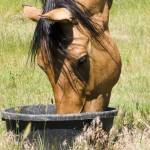Help Horses Recovering from Diarrhea

Potential causes of diarrhea, often referred to as colitis, runs long. If your horse suffers a bout of colitis, what feeding strategies can you use to help repair the gastrointestinal tract?
“Diet can impact either the progression or resolution of colitis. Appropriately feeding any horse with colitis could help save his life as the sequelae associated with diarrhea can be disastrous, such as laminitis,” says Kathleen Crandell, Ph.D., a nutritionist for Kentucky Equine Research. Causes of colitis include:
- Infectious agents, such as Salmonella spp., Clostridium difficile, and Clostridium perfringens;
- Potomac Horse Fever caused by Neorickettsia risticii;
- Parasitism (e.g., small strongyles);
- Antibiotic- or nonsteroidal anti-inflammatory drug (NSAID)-associated diarrhea; and
- A myriad of unrelated causes, including sand impactions, dietary imbalances, food allergies, neoplasia (cancer), inflammatory bowel disease, and more
Once your veterinarian identifies a culprit for your horse’s colitis, targeted therapy can be initiated. This often involves supportive care, such as intravenous fluid therapy administration and specific nutrition.
“Re-establishing the population of microorganisms in the horse’s intestinal tract, referred to as the microbiota, jump-starts the fermentation of feeds,” Crandell noted.
“Ideally, the owner or manager would attempt to return the horse to a normal diet as soon as possible. One major problem, as we know based on our own experiences with the condition, is that many horses have decreased appetites or are anorexic while suffering colitis. We also know we can’t make a horse eat.”
While the best diet will ultimately depend on the underlying diagnosis, here are some general suggestions to increase appetite in horses:
- Allow the horse to graze fresh, green grass if it is available. Not only is grass high in nutrients, it also has many beneficial microbes;
- Try a warm mash of bran soaked with alfalfa pellets. Molasses, cut carrots, or chopped apples can make it tastier;
- Add a little raw apple cider vinegar to the feed to perk appetite and give a microbial boost;
- Divide the total amount of feed per day into smaller, more frequent meals to lessen the impact on the digestive tract.
“Offer a smorgasbord of different feeds and let the horse decide which is most appealing,” suggested Crandell.
In addition to providing access to experienced nutritional consultants, Kentucky Equine Research offers several products that help buffer the stomach and hindgut to support the normal intestinal microbiome, including Triacton, RiteTrac, and EquiShure, as well as an omega-3 fatty acid supplement, EO-3, which serves as a natural anti-inflammatory.








